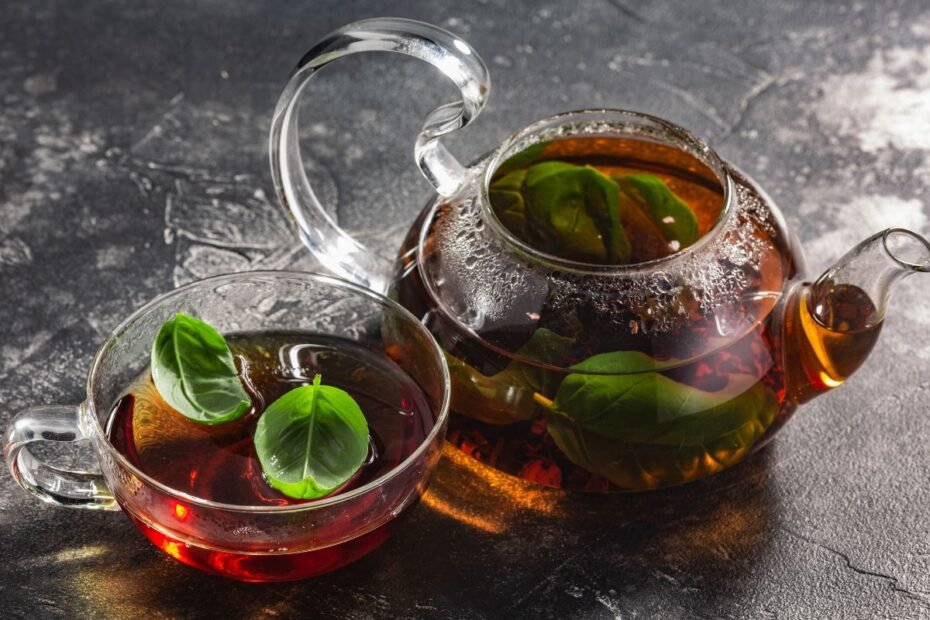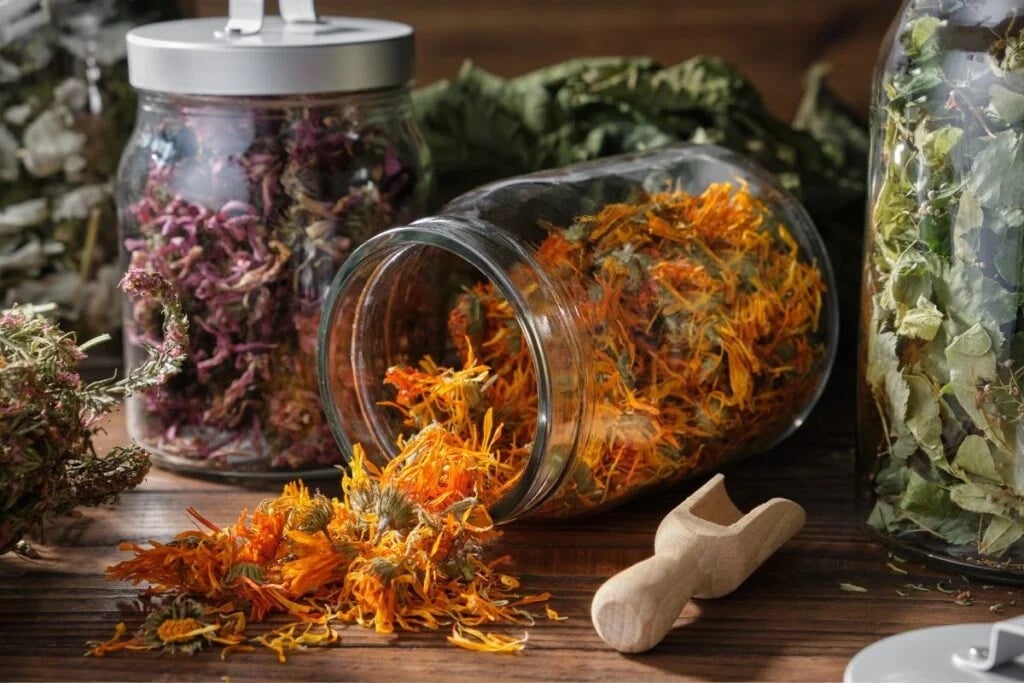Many people know, use, and even grow basil. It is an integral spice in Italian cuisine and goes well with pasta dishes. It is popular both fresh and dried. But did you know that basil tea is just as noteworthy? Find out what ailments it can help with and what other basil tea benefits are worth discovering.
What Is Basil?
Basil (Ocimum basilicum) is used for food and tea. It is native to southern Asia but grows well in other countries. Basil is an annual herbaceous plant. It belongs to the Lamiaceae plant family. It grows up to 30-70 cm tall. The stem is steep, branched, and four-trunked. The plant has stalked, ovate, greenish, or reddish-purple leaves.
Grown basil usually flowers in July. The flowers may be pinkish, reddish-purple, clustered in whorls of three in the leaf axils. Once it blooms, you can harvest and dry basil to make tea. Fresh or dried basil leaves are used for seasoning.
Seed the basil at the beginning of April in a greenhouse, or all year round on the windowsill. Additional lighting and a bright, warm place to grow are necessary during the cold season.
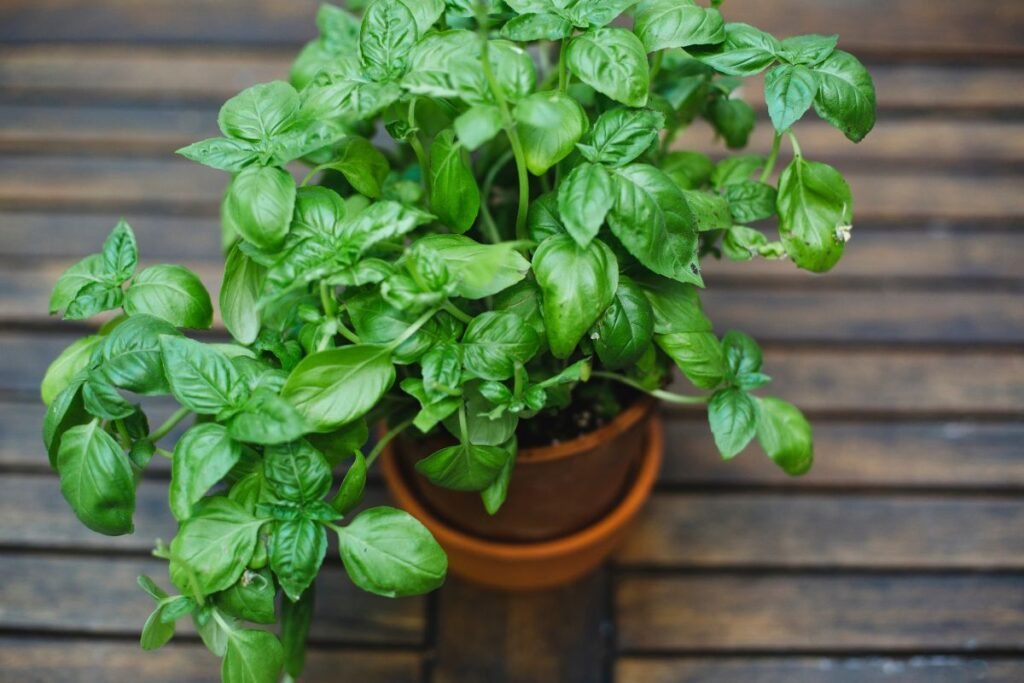
How to Dry Basil?
You can dry the young basil leaves, picked before the plant flowers. Or harvest the whole above-ground part of the basil once it has flowered. Of course, if you grow basil at home on your windowsill, you can also make basil tea from fresh leaves.
As basil accumulates a large amount of water, it is advisable to dry it in a specialized drying rack or oven. When drying in the oven, spread the dry basil as thinly as possible and set 90–100 °C. Check the drying process from time to time and turn it over.
If you try to dry the basil, choose a dark, dry, well-ventilated room protected from direct sunlight. Spread the leaves thinly on a cloth. Then tie dry stems and leaves in a bundle and hang them upside down on the deck. Such bundles should be as thin as possible for better air circulation and faster drying.
However, natural drying is risky as basil is challenging to dry, blackens quickly, and molds.
You should crush the dry basil raw material with your fingers. Then store this mass in airtight paper or linen bags in a dark, well-ventilated, dry place.
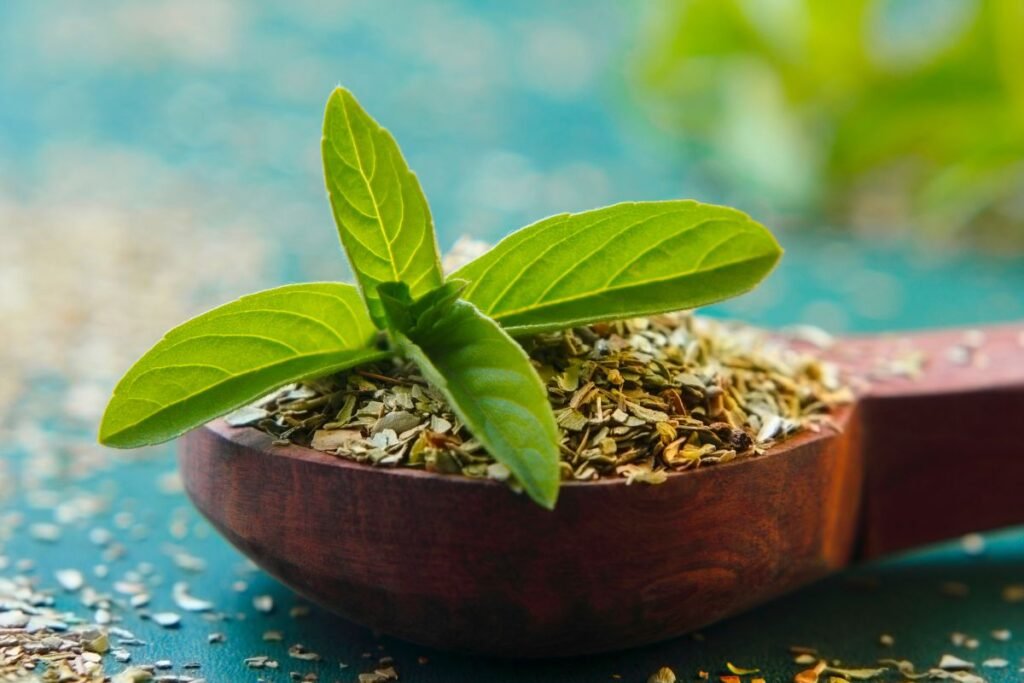
Freezing Basil
Another great way to prepare your basil stock is to freeze it. Collect the leaves or the above-ground part, wash it well, drain it very well, chop it up, and put it in freezer bags. Add 1-2 teaspoons of basil from the freezer for making tea or flavoring dishes when needed.
It is not recommended to freeze whole basil leaves. This leads to the loss of shape and appearance when thawed. Chopped ones are also easier to dose for the brewing of tea.
Health Benefits of Basil Tea
There is a reason why basil has always been considered a crucial herb. It represented a royal herb for the French, a sign of love for the Italians, and a sacred herb for the Indians. Basil is not only notable for its smell and taste but also for its medicinal and nutritional properties.
It has vitamins K and A, manganese, magnesium, carotene, phytoncides, and rutin. Drinking basil tea may boost immunity and help with colds, flu, and other ailments. Basil tea has a toning effect that can replace coffee.
Basil tea benefits are:
- Has antibacterial properties. Some studies show that basil can even fight or slow down the growth of some antibiotic-resistant bacteria.
- It is an excellent antioxidant that protects cells from the harmful effects of free radicals.
- It has anti-inflammatory properties similar to popular drugs such as ibuprofen and aspirin. Basil tea is particularly effective in treating inflammation of the intestines and joints.
- The vitamin K in the tea ensures good absorption of calcium, which is crucial for bones.
- It strengthens the walls of blood vessels and thus ensures good vascular health.
- Manganese increases the speed and strength of nerve impulses, so basil tea can help maintain good cognitive function for longer.
- It can help with colds, flu, and fever.
- Basil tea compresses treat skin wounds and dermatitis. These compresses are also beneficial for soothing red eyes.
Holy basil tea benefits bring further properties, such as malaria treatment or eye health improvement.

Who Shouldn’t Take Basil Tea?
Despite basil’s usefulness as an herb and medicinal plant, some people are advised not to take basil tea or other basil preparations. Basil tea is not recommended:
- For people with low blood sugar levels, basil has a sugar-lowering effect and can cause hypoglycemia.
- For women trying to conceive, it reduces fertility.
- In pregnant women, it can cause bleeding, uterine contractions, and miscarriage.
- The patients, who take blood thinners. Those taking medicines such as diazepam, pentobarbital, or scopolamine should be sure to check with their doctor about the use of basil tea or other preparations. Basil may affect the effects of these and some other medicines.
- Persons allergic to plants of the Lamiaceae family should also refrain from basil.
Basil Tea Benefits for The Flu
Basil has tonic properties and is vital for recovering from the flu. It also strengthens immunity and helps to overcome the illness more quickly.
Ingredients:
- 1 tbsp. of basil herb;
- 1 glass of water.
Preparation: cover the basil with boiling water, cover, and leave to steep for 10–15 minutes. Drain.
Use: drink a glass of tea 2-3 times a day.
Tip: If you have a fever, it is advisable to add a pinch of ground black pepper to basil tea to help bring the temperature down.
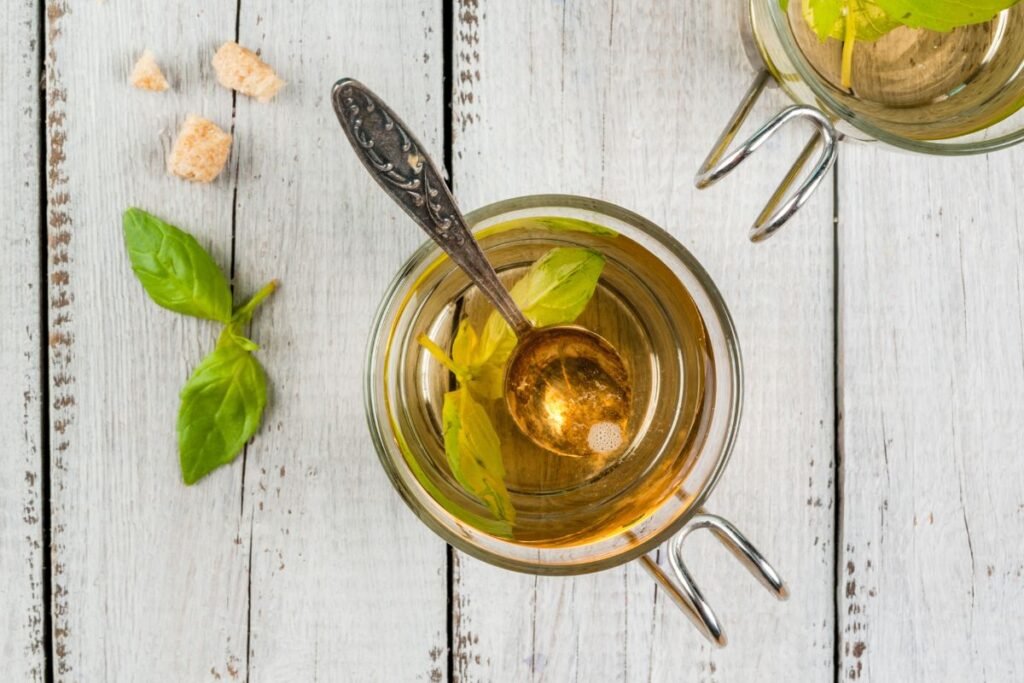
Soothing Basil Tea Benefits
This basil tea benefits include calming the nervous system, lifting the mood, and helping with depression. It will stop vomiting and nausea too.
Ingredients:
- 1 tbsp. of basil herb (stems, leaves, and flowers);
- 1 glass of water.
Preparation:
Add the basil to a saucepan and pour it over a glass of boiling water. Boil for about 5–10 minutes and leave to steep for 30 minutes. Drain.
Use: drink ¼ glass four times a day before meals.
Tip: This tea is recommended to be drunk in the morning, flavored with honey, to improve performance and keep the mind sharp throughout the day.
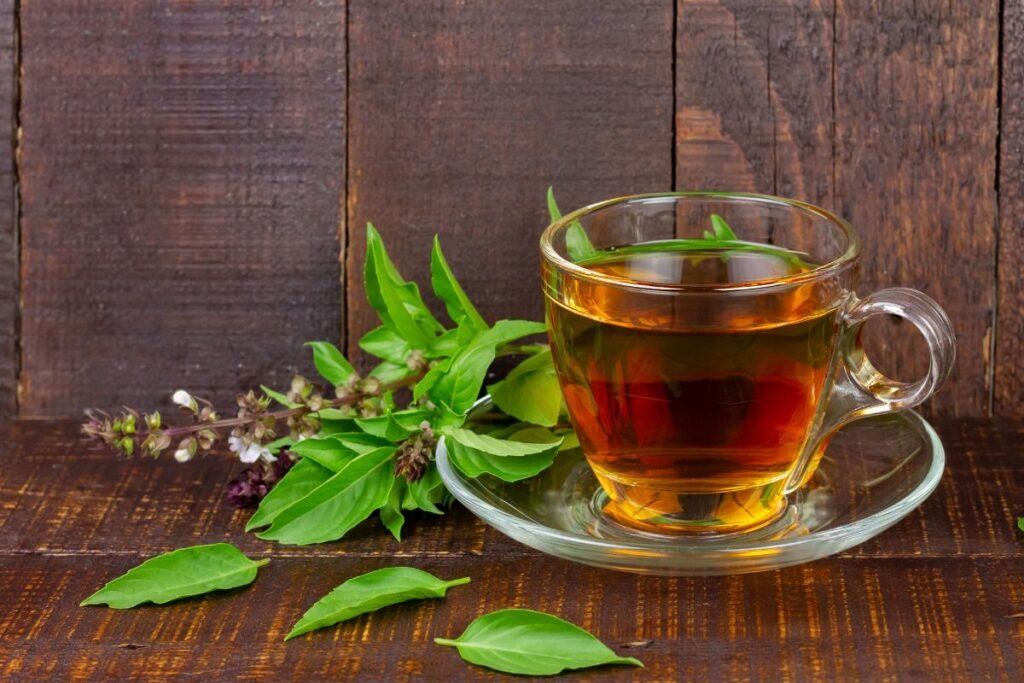
Basil Tea Benefits for Colds
This tea is recommended for colds, coughs, runny noses, and stuffy noses. Not only will it make you feel better, but it will also help you fight germs, get well faster, and recover from illness.
Ingredients:
- ¼ tbsp. of basil herb
- ¼ tsp. of crushed ginger root or powder
- ½ tsp. of cinnamon
- 1 glass of water
Preparation:
Put all the ingredients in a saucepan and cover it with a glass of boiling water. Boil for about 5 minutes and leave to simmer for another 5–10 minutes. Drain.
Use: drink a glass 2-3 times a day.
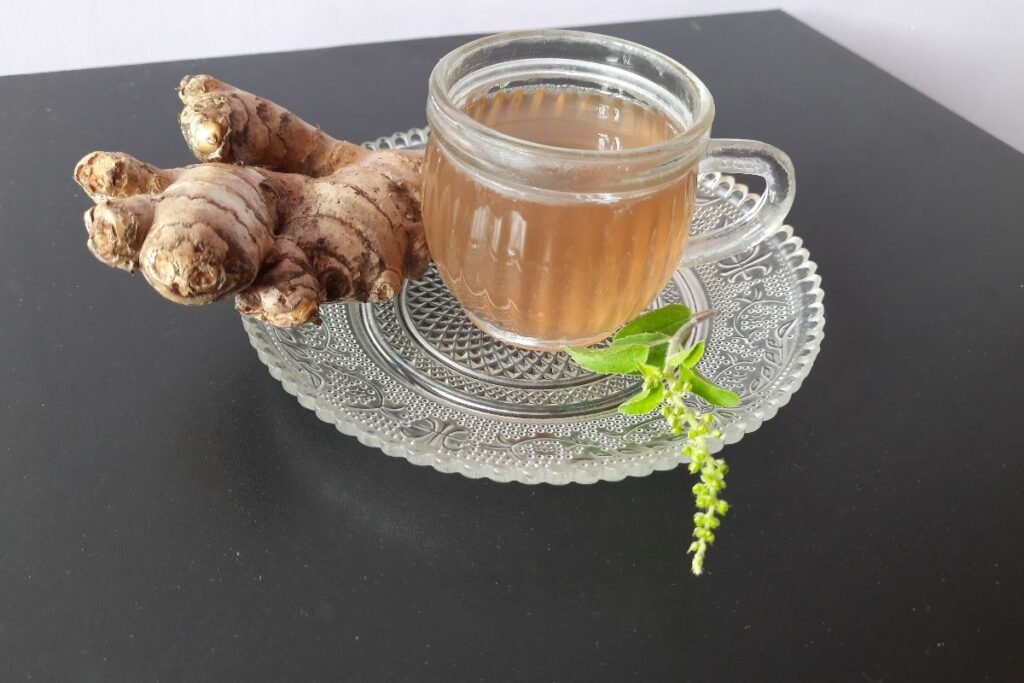
Basil tea is a warm drink with healing properties and helps to overcome various ailments. It is also a wonderfully refreshing beverage. You can prepare iced tea with fresh basil leaves in the summer. In addition, a basil leaf thrown into water disinfects it. And, of course, it gives the drink a pleasant taste and smell.
Sources:
https://www.vle.lt/straipsnis/bazilikas/
https://www.webmd.com/vitamins-and-supplements/holy-basiil-uses-and-risks
https://www.rxlist.com/supplements/basil.htm
https://www.lybrate.com/topic/basil-benefits-and-side-effects
Associative photos from © Canva.
